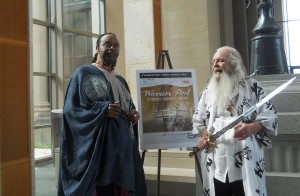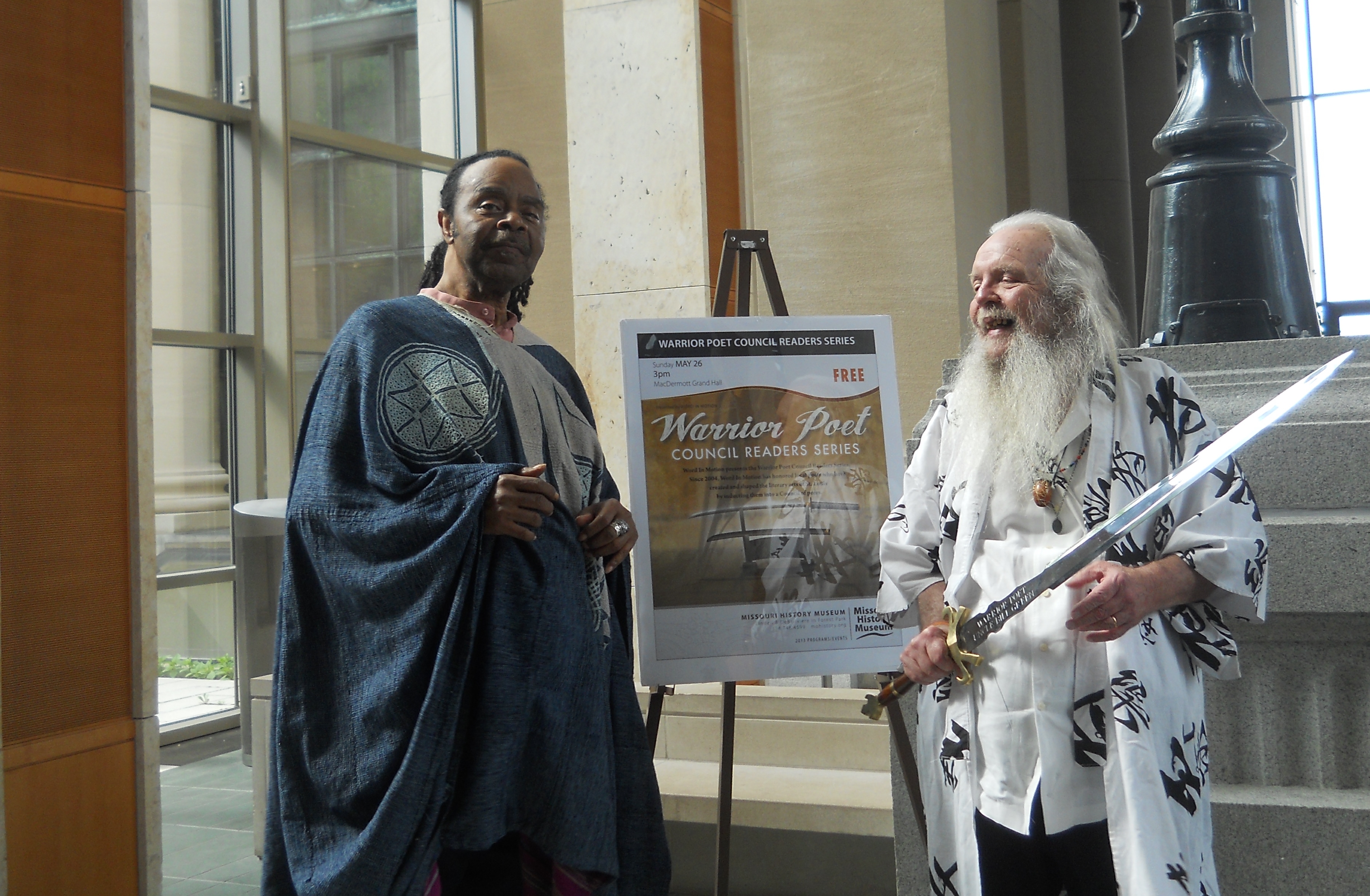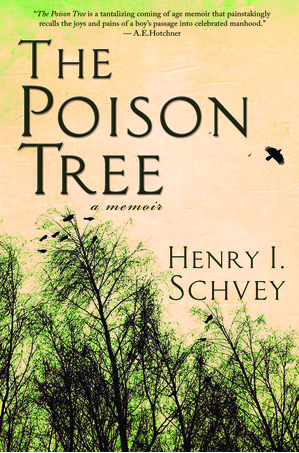Share the post "Warrior Poets Present at Missouri History Museum"
by Diana Davis
 Kevin McCameron has a long history of working with the Arts and Arts Organizations in St. Louis. He has performed in at least 75 theatrical stage productions plus a variety of feature films and commercials. He has taught workshops and classes on poetry, publishing, acting, and other subjects. His history made him a natural fit to start and host the St. Louis Poetry Slam held every 3rd Wednesday since 1997 at the Focal Point, located at 2720 Sutton in Maplewood, Missouri. The winners are awarded a $50 cash prize. Each year, the group selects one poet to become a Warrior Poet. The criteria for nomination is one who has been on the reading scene for 25 years or more and who has been published nationally. The Warrior Poet is presented with an engraved sword.
Kevin McCameron has a long history of working with the Arts and Arts Organizations in St. Louis. He has performed in at least 75 theatrical stage productions plus a variety of feature films and commercials. He has taught workshops and classes on poetry, publishing, acting, and other subjects. His history made him a natural fit to start and host the St. Louis Poetry Slam held every 3rd Wednesday since 1997 at the Focal Point, located at 2720 Sutton in Maplewood, Missouri. The winners are awarded a $50 cash prize. Each year, the group selects one poet to become a Warrior Poet. The criteria for nomination is one who has been on the reading scene for 25 years or more and who has been published nationally. The Warrior Poet is presented with an engraved sword.
McCameron has also organized a group called “Word in Motion” which invites St. Louis literati to readings by the Warrior Poet at various venues around the city. On Sunday, May 26th, McCameron hosted a reading in the MacDermott Grand Hall of the Missouri History Museum, featuring two Warrior Poets, Hari Sky Campbell and Uncle Bill Green.
Hari received his Master of Fine Arts degree from University of Missouri-St. Louis in May of 2001. He was nominated for the Pushcart Prize in 2006 and was awarded 1st place by the St. Louis Area Jobs with Justice in the Spoken Word category. He has earned many other awards. Hari showed his chapbook titled Shawmaul’s House in which he has composed poetry reflecting his family and the era in which they lived in the city of St. Louis.
Hari teaches poetry in the Springboard to Learning educational program in the St. Louis area public schools. He said his students ask him where he gets his ideas for writing poetry. He tells them, “Poems are everywhere; just look round you.” The second question his students ask is, “Well, how do you write it down?” To which Hari responds, “Why, with a pen! People just have to listen and look, and then remember and write about what you see and hear.”
Sometimes, Hari gets what he calls a found poem, meaning he will hear a conversation, reflect on what he has heard and then write it down. To illustrate his point, he read, “Talk’n with an old Man.” Hari was in the hospital room and the voice of an old man floated to him through the white grey darkness, “You sleep? Old timers disease. They said I got old timer’s disease.” With his back to the voice, Hari replied, “Alzheimer’s, you mean.” What followed was an exchange reminiscent of the Abbot and Costello bit about “Who’s on First.” “That’s what I said,” replied the old man.” “You said, ‘old-timer’s disease.'” “What? Old-timers disease, right!” the voice replied.
Hari can make you laugh, and he can make you cry. Hari grew up in the days when entitlement wasn’t a word used in relationship to childhood. In those days, the dour sentence regarding offspring was “Children are to be seen and not heard.” In that regard, Hari recalled getting the Sears and Roebuck “Wish Book” (the Christmas catalog with pages full of toys). He remembered how he and his brother and little sister got on their knees and prayed for the items in those pages and then lay worrying that they had asked for too much or wondering if their messages had gotten through to God.
He shared another childhood memory called “The Duck Picture.” It is the tale of the day his brother and he came home from school to the Pruitt Igoe apartment complex and saw a pile of furniture with a duck picture leaned against the pile. They wondered who had failed to pay the rent and were having their belongings placed out on the street. They marveled that those people had a duck picture like their family had. They ran eight flights up to their apartment (they lived in Apt. # 805), but they were unable to enter. Finally, it dawned on them that the duck picture was theirs, and they were the ones being relocated.
Kevin McCameron next introduced Uncle Bill Green. Uncle Bill did not read any Haiku. He instead did a monologue on recent tragedies. He said the world is too full of hate and retaliation. There are too many costs of war –
There were 58,000 American losses in Vietnam. Families were torn asunder by the loss of husbands and wives; fathers and mothers. Our military personnel are heroes.
Uncle Bill Green said that teachers are not paid enough. The average salary of teachers in Moore, Oklahoma was $32,000 a year. And yet, during the May 20th tornado, one elementary school teacher told her children to lie in a pile on the floor, and then covered them with her own body to protect them from flying debris. One little child pleaded, “Please don’t die with me.” She responded, “We are going to be all right.” And they were, although 10 other children died in the disaster. Teachers are heroes.
During the 911 attacks, 2900 people died. New York City police, medical personnel, and fire fighters raced to rescue whom they could; many died in the process. Uncle Bill said we should learn that love transcends ego. Love never dies. Our first responders are heroes.
Uncle Bill suggested that people learn to cherish simple pleasures. “The cat is happy. The cat finds a spot in the sun and purrs. If you want to have a wonderfully happy life, keep your wife and the cat happy. I haven’t had the need to call anybody ‘Sir’ since I left the Navy. And I spent the rest of my life in play clothes. I’m happy.” Uncle Bill proclaimed.
The next presentation of the Warrior Poets at the Missouri History Museum will be on Sunday, June 30th at 7 p.m.



